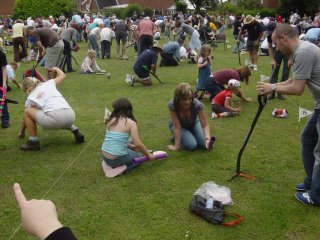Knutsford SciBAr - Poetry and Science
A fascinating session at SciBAr last night. On a sweltering July night, about fifty people crammed into a back room of a bar in Knutsford to hear an account of relativity – a talk followed by a question time which was challenging and wide-ranging. Professor Jeff Forshaw (from
It’s really exciting that so many people care enough about ideas to form groups like this. More info about SciBAr: ( www.knutsford-scibar.co.uk ) In Macclesfield they have started a ‘Literary and Philosophical Society’ which will have meetings in the Library in the Autumn. This will have a similar agenda of encouraging discussion of ideas, although its brief will be much wider than SciBAr. I hope to present a talk for them on Science and Poetry.
I was at SciBAr to bring a poem I’d written after an earlier session on ‘All about Memory’ – so this was a fairly rare conjunction between poetry and science. Here are a few first thoughts on the issue – and the poem:
Poetry and Science are two ways of looking at the world. Like science, poetry investigates experience, presents the data.
A poem is not just the observation, the results of the experiment – a poem is itself a repeatable experiment in the field of language. When you read a poem – if it works – the experience of the writer happens all over again. There’s ‘a shock of recognition’ I get it!
Science strives for accuracy. A poem makes room for, even encourages, ambiguity. The poet is trying to hit a moving target, directing the flow of a river which is always bursting its banks. Poetry has a sense that experience is bigger than the words we try to shoehorn it into, but that, if we get the words right, then that experience can be communicated.
The poet may be closely observing a particular experience, but the poem takes the data out of context. In the poem it can ‘fit’ all kinds of other experiences. The experience may be local, particular – the poem can be universal.
Wordsworth’s ‘Daffodils’ is not, first of all, about daffodils: it’s about the recovery of sensory data.
All About Memory
A lost memory
is ringing, ringing, somewhere
behind the bar. Will someone answer it
please.
What were you doing?
What was the weather like?
What were you thinking about on that day?
A candle was burning, your wine
lay red in the glass. Pigeons were
bobbing into the gap, under the eaves
of the opposite windows. A pint
clunked on the table. I remember
how good you were at digits.
How does it all link together
the space, and the smell, and the word?
A herdsman’s skill, a kitten blind
in the blinding dark.
Do you know that you don’t know?
Can your brain be hard-wired to remember?
Can you be trained to forget? I knocked
on a door, a door that wouldn’t open.
How does it all link together
the space, and the smell, and the word?
A herdsman’s skill, a kitten blind
in the blinding dark.
Her research is in memory
for faces. She scans the crowd.
She takes a sip, nods, looks intently
at the questioner, hands crossed in her lap.
Actually knowing that you’ve seen
a face before. It’s stored
as a configuration, something resilient
that doesn’t change with age.
How does it all link together
the space, and the smell, and the word?
A herdsman’s skill, a kitten blind
in the blinding dark.


